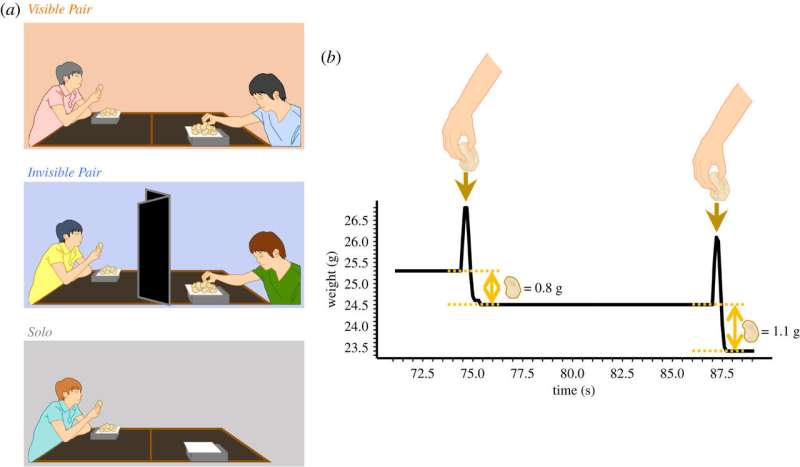April 1, 2020 report
Researchers find eating with someone else makes people eat smaller portions, but more often

A team of researchers at the University of Tokyo has found that people tend to consume smaller amounts of food when they are with someone else than when alone, but eat more often. In their paper published in the journal Royal Society Open Science, the group describes experiments they carried out with volunteer eaters and what they found.
Prior studies have shown that when animals in the wild forage together, they tend to eat smaller portions than when alone, but they eat more frequently. In this new effort, the researchers wondered if the same might be true for humans.
To find out if people automatically shift foraging habits when eating with others, the researchers conducted an experiment that involved volunteers sitting at a table and eating potato chips. In some scenarios, a volunteer sat alone eating chips; in others, two people ate chips at the same table across from one another. In all cases, each volunteer was given a plate onto which a portion of potato chips had been placed—and all portions were equal in size. The researchers also placed a hidden scale beneath the table to help estimate portion size and consumption.
The researchers found that when people were paired up, they tended to eat smaller portions than when eating alone, but they ate more often. The end result was that they wound up eating the same amount of food regardless of whether they ate with someone or alone—all that had changed was the manner in which the chips were eaten.
The researchers note that "fast and easy" foraging in wild animals is a common practice, likely because it reduces the chances of having a meal stolen by a competitor. They also note that because the change in eating patterns in the volunteers were seen in all of participants, they suggest it indicates that such changes are automated—the people involved did not decide to change their eating behavior, they did it without thinking about it. And that suggests it has been a part of human behavior for a long time—our ancestors likely used it to maximize their food intake based on competition from their peers.
More information: Yukiko Ogura et al. Mere presence of co-eater automatically shifts foraging tactics toward 'Fast and Easy' food in humans, Royal Society Open Science (2020). DOI: 10.1098/rsos.200044
© 2020 Science X Network


















